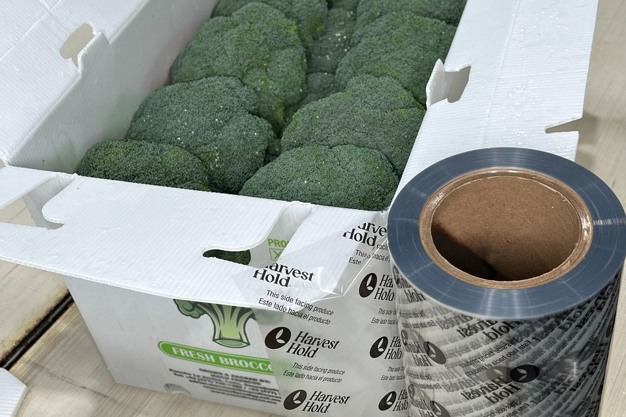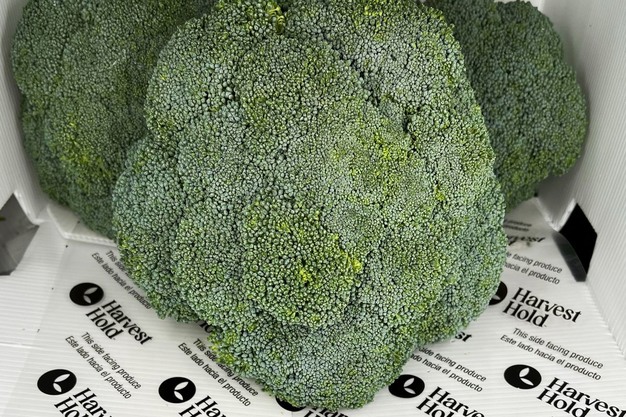The transportation of broccoli from the field to the warehouse and the store typically involves ice. Lots of it. In a 40 lb. box of broccoli, only half of that weight actually comes from broccoli; the other half comes from approximately 2.5 gallons of water, equaling 9.5 liters. Over the past few years, Verdant Technologies and Canadian retailer Sobeys have been talking about bringing innovation to the market and felt a big difference could be made in removing ice from the broccoli supply chain.
More efficient transportation
Going iceless significantly contributes to water conservation efforts. "About 13,000 liters of water can be saved per truckload of broccoli," says Matt Aronson, CRO of Verdant Technologies. In addition, it also reduces the weight of a box of broccoli, optimizing space on the truck. This allows for more boxes of broccoli to be transported on a single truck. Right now, due to the weight of ice, the number of boxes that can be transported on an 18-wheeler is limited to 1,100. However, removing ice results in a truck being able to carry 1,600 boxes of broccoli instead. "In other words, a full truckload can be saved for every three trucks of broccoli, making transportation much more efficient," says Thomas Pierce, National Director of Supplier Development & Direct Store Delivery at Sobeys. In addition to the sustainability benefit of saving water, it also results in substantial cost savings.

Shelf-life extension
There's a third benefit, which is Verdant's HarvestHold Fresh technology that extends the shelf-life of broccoli. "Through our collaborative approach with Sobeys and its grower partners, we've shown that broccoli transported without ice using HarvestHold Fresh retains its fresh, vibrant green hue and firmness up to a week longer than its ice-shipped counterparts," Aronson said. "Altogether, this allows us to be more competitive," Pierce commented. The HarvestHold Fresh technology is an in-box sheet that extends freshness and shelf-life. It is placed in produce boxes immediately after harvest and the active ingredient blocks ethylene, delaying ripening and allowing produce to maintain its vitality and taste for longer.
Recyclable box
The partnership between Verdant Technologies and Empire Company Limited, parent company of Sobeys, started a few years ago. "We've worked with our growers and brought them along in the process," shared Pierce. "We didn't want to force it upon our growers but took the time to build a partnership that benefits all parties involved." Bringing in growers in the partnership has resulted in an additional, unexpected advantage. "Since the boxes with broccoli no longer contain ice, the need for wax boxes can be eliminated in many cases." Instead, broccoli growers are now able to use a recyclable box.
Since 2022, Empire's growing partners have been using the iceless HarvestHold technology in bunch broccoli packing in Quebec and Ontario at Sobeys, IGA, Foodland, and FreshCo banner stores. It made Empire the first major grocery retailer in North America to adopt the technology. In 2024, the partners plan to expand nationally and are anticipating a substantial environmental impact. "Taking 500,000 boxes of broccoli as a benchmark, the water conservation equates to filling two Olympic-sized swimming pools or maintaining an NHL hockey rink for an entire season."

Collaborative approach
"We wanted to ensure that we didn't force anything upon our growers," Pierce commented. "It was crucial that our growers and partners understood the process. The focus was on collaboration and partnership, not just dictating what to do. A lot of the time was spent ensuring that we worked together, brought everyone along, and that everyone understood the benefits and the process."
Commitment to sustainability
"To be sustainable as a society, we must share our innovations," continued Pierce. "This isn't just about what we're doing; it's about sharing our successes so others can benefit, too. If we only focus on reducing our own costs and improving our own efficiency, we're only playing a small part. The goal is to contribute to a broader societal benefit, which includes being open to others benefiting from these innovations as well. It's about doing our part for the industry and society at large."
 For more information:
For more information:
Steven Oklesh
Verdant Technologies
[email protected]
https://verdant-tech.com
